News

24-Hour High-Risk Flood Alert Issued for Maha Oya Low-Lying Areas
The Irrigation Department has announced a high-risk flood warning for low-lying areas surrounding the Maha Oya Basin over the next 24 hours. The alert comes after significant rainfall was recorded across the upper catchment during the past day.
Officials warn that the volume of water flowing downstream could trigger severe flooding, potentially exceeding levels experienced in recent years. Communities living in at-risk locations have been urged to evacuate to safer ground without delay as authorities continue to monitor rising water levels.

Kegalle: Colombo–Kandy Main Road Shut Amid Landslide Threat
A stretch of the Colombo–Kandy main road between the 88 km and 89 km posts in Meepitiya, Kegalle, has been closed due to landslide risks.
The Disaster Management Centre (DMC) has urged motorists to take alternate routes and exercise caution.
The public has also been advised to avoid travelling on this section of the road unless absolutely necessary.

Main Line Train Services Halted as Flooding Hits Key Track Sections
Railway authorities have announced the temporary suspension of train services on the Main Line this morning after several track sections, particularly in Daraluwa and Gampaha, were impacted by flooding. Officials say the decision was necessary to ensure passenger safety.
The disruption comes amid continuous heavy rainfall across many parts of the country, which has led to significant waterlogging and increased the risk of operational hazards along the line. Authorities are monitoring the situation and will restore services once the tracks are deemed safe.

A Member of Parliament resigns.
Samagi Jana Balawegaya (SJB) MP Ismail Muththu Mohamed has announced that he is stepping down from his position in Parliament.
He revealed his decision while making a statement in the House today (28).
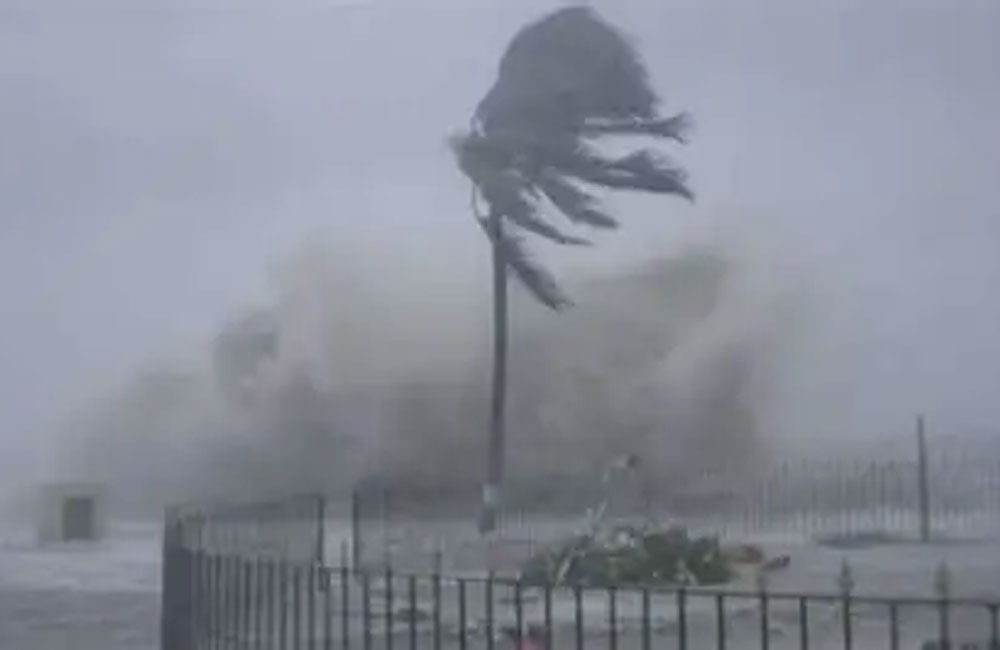
India Issues Red Alert as Cyclone “Ditwah” Targets Tamil Nadu Coast
Cyclone “Ditwah” is steadily shifting away from Sri Lanka and tracking toward the Bay of Bengal coast, with its path now directed at Tamil Nadu, according to the India Meteorological Department (IMD). The storm is forecast to make landfall over north Tamil Nadu, Puducherry, and parts of south Andhra Pradesh early on November 30.
The IMD warns that these regions are likely to experience heavy to extremely heavy rainfall on November 29 and 30. A red alert has been issued for districts such as Cuddalore, Mayiladuthurai, Villupuram, Chengalpattu, and Puducherry, where rainfall totals may exceed 21 cm.
In addition, strong winds reaching speeds of up to 90 km/h are expected to sweep across many areas of Tamil Nadu today, prompting authorities to urge residents to stay alert and follow safety advisories.
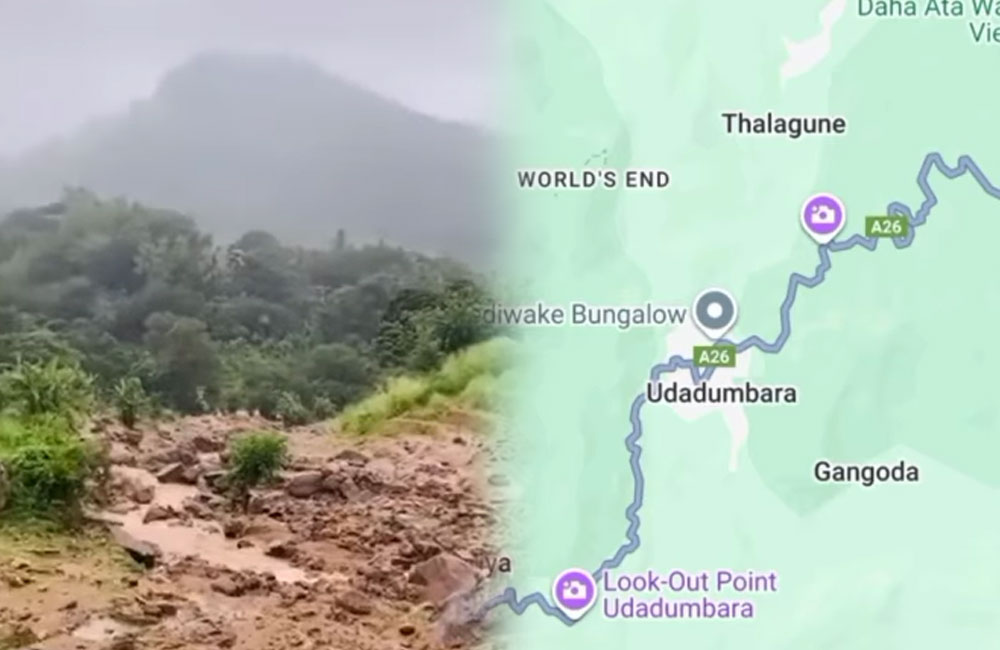
Three Dead, 17 Missing After Earthslip in Gangoda, Kandy
The Disaster Management Centre (DMC) reports that three bodies have been recovered following an earthslip in the Gangoda area of Kandy. Authorities also state that at least 17 people are currently unaccounted for.Emergency response teams are on-site carrying out search and rescue operations, while officials monitor the area for further risks. The DMC says updates will be provided as efforts continue to trace the missing individuals.

India Assists Sri Lanka with INS Vikrant Helicopters; Sajith Thanks on X
India Deploys INS Vikrant Helicopters to Aid Sri Lanka’s Cyclone “Ditwah” Relief Efforts; Sajith Premadasa Expresses Gratitude
India has stepped in to assist Sri Lanka as Cyclonic Storm “Ditwah” continues to generate destructive weather across the island, triggering widespread flooding, strong winds, and emergency rescue operations.
The Government of India has agreed to deploy helicopters from the aircraft carrier INS Vikrant, which is currently docked in Colombo, to support Sri Lankan authorities in ongoing rescue, relief, and evacuation missions. The helicopters are expected to enhance aerial surveillance, transport emergency supplies, and assist in reaching areas that have become inaccessible due to the severe weather.
The gesture of support comes at a critical time, with multiple regions across the island experiencing disruptions and rising safety concerns.
Opposition Leader Sajith Premadasa publicly thanked India for its timely assistance. In a message posted on X, he extended his appreciation to the Indian government and the crew of INS Vikrant, noting that regional cooperation plays a vital role during humanitarian crises.

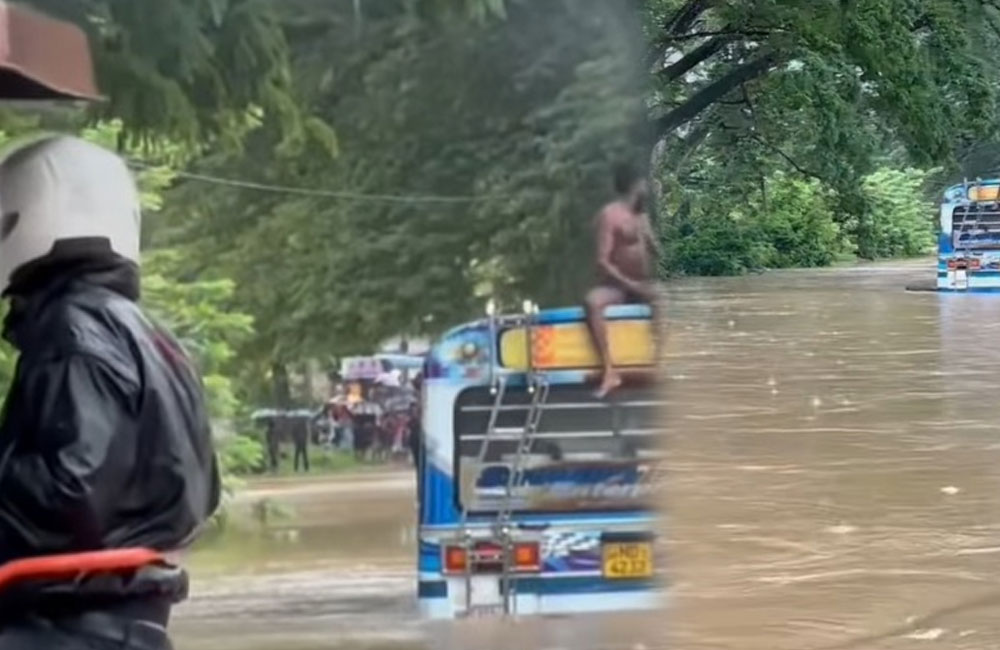
23 Passengers Saved After Bus Carried Away by Floodwaters in Kumbukkana
Severe rainfall in the Monaragala district has caused the Colombo–Wellawaya main road in the Kumbukkana area to become flooded, according to the Disaster Management Centre. The flooding resulted from the Kumbukkan Oya overflowing its banks, leaving parts of the roadway impassable.During the incident, a bus carrying 23 passengers was caught in powerful currents and swept off course as it attempted to navigate the submerged stretch. Emergency teams responded swiftly, rescuing all passengers without delay. Efforts to retrieve the stranded bus from the floodwaters are continuing.

Sri Lanka on Red Alert as Cyclone ‘Ditwah’ Intensifies
The Meteorology Department has issued a Red Alert for both land and surrounding sea areas as Cyclonic Storm “Ditwah” intensifies.
According to the department, the storm is currently positioned near latitude 8.3°N and longitude 81.0°E, approximately 40 km southwest of Trincomalee, and is expected to move north-northwest.
Heavy rainfall and strong winds triggered by the system are forecast to continue across the island. Intermittent showers and thundershowers will affect most regions.
Rainfall exceeding 200 mm is likely in parts of the Northern, North-Central, Central, North-Western, Sabaragamuwa, and Western provinces. Areas in Trincomalee, Badulla, Galle, and Matara districts may receive more than 150 mm, while other regions could see rainfall above 75 mm.
Winds of 60–70 km/h, with gusts reaching 80–90 km/h, are also expected over many parts of the island.
The public is urged to take necessary precautions to minimize the impact of heavy rains and strong winds.
Naval and fishing communities have been advised not to venture into sea areas around the island until further notice.
Authorities also request residents to stay alert for updated advisories and to contact local disaster management officials in case of emergencies.
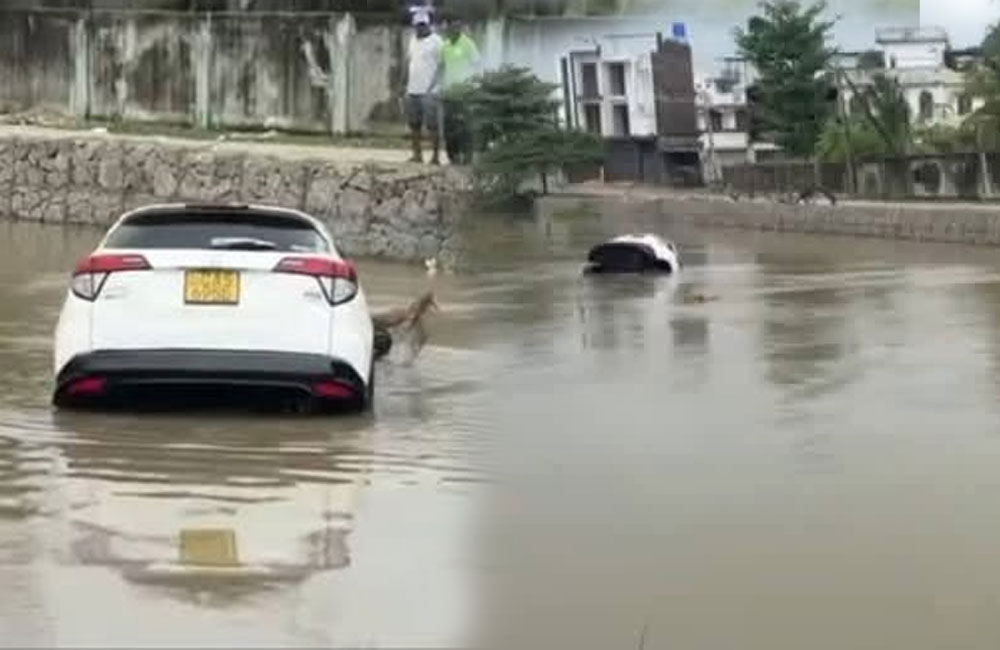
Three Killed After Vehicle Plunges Into Canal in Sainthamaruthu
Three people lost their lives in a road accident in the Sainthamaruthu area of Ampara after the vehicle they were travelling in skidded off the road and fell into a canal near Bolivia village. According to police, the incident occurred earlier today, and all three occupants of the vehicle were confirmed dead.
Authorities have launched an investigation to determine the circumstances that led to the vehicle plunging into the canal. Further updates are expected as inquiries continue
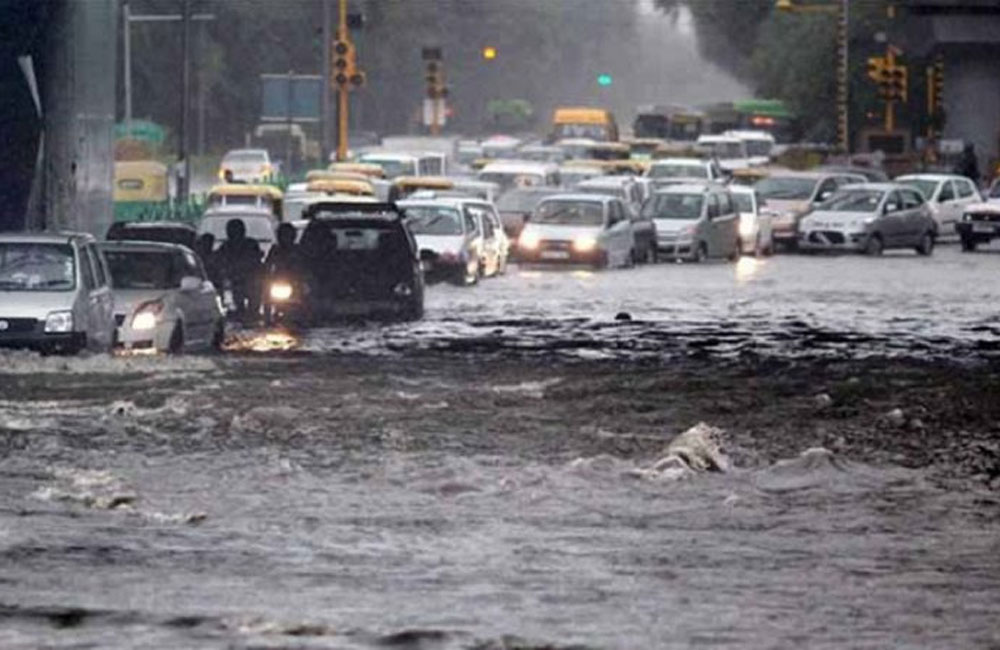
Police Warn of Traffic Disruptions as Severe Weather Hits Colombo
Police say several areas in Colombo have been affected by the severe weather conditions sweeping across the island, with flooding and fallen trees blocking multiple roads.
The disruptions have caused heavy traffic, and motorists are advised to use alternate routes until clearance operations are completed.
The affected locations include:
-
Premasiri Khemadasa Mawatha and Keppetipola Mawatha, near Lionel Theatre
-
National Hospital Gate 4
-
Elvitigala Mawatha
-
Queen’s Road Junction
-
Kotahena Armor Barber Junction, near the temple
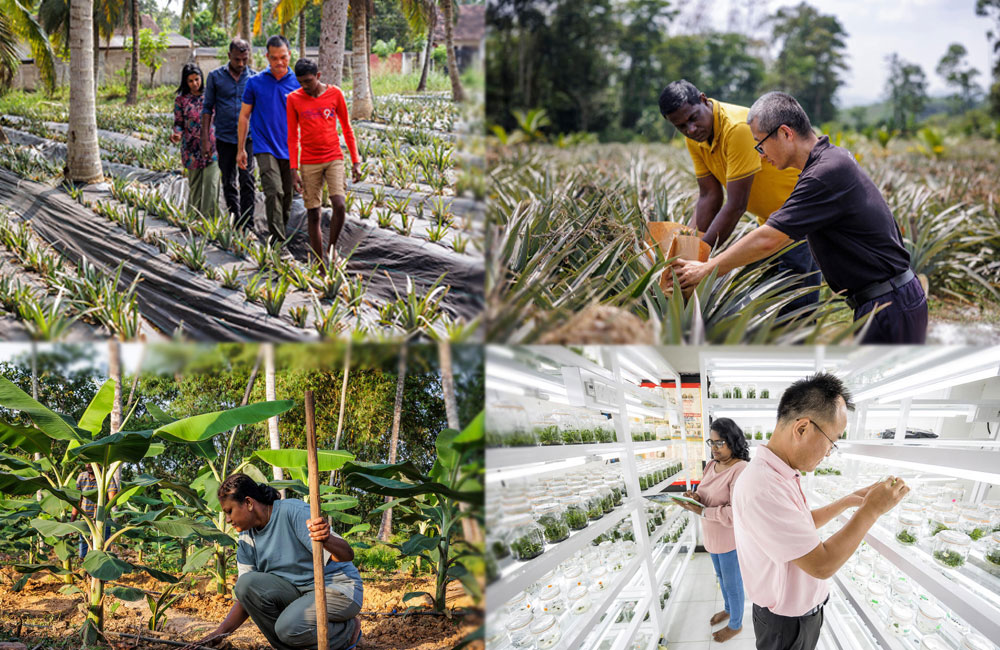
FAO’s South-South Cooperation Project with China Leads to 300% Increase in Pineapple Yield
27 November 2025, Colombo – A transformative South-South Cooperation initiative between the Ministry of Agriculture and Rural Affairs (MARA) of China, the Food and Agriculture Organization of the United Nations (FAO) and the Ministry of Agriculture of Sri Lanka has delivered remarkable results in strengthening Sri Lanka’s fruit value chains. The two-year project, which ended this year, was implemented in collaboration with the Chinese Academy of Tropical Agricultural Sciences (CATAS) and achieved significant productivity, quality, and capacity gains for banana, mango, and pineapple production across ten model farms established in Colombo, Kurunegala and Anuradhapura districts.
Key achievements include:
- Boosting productivity: Pineapple yields tripled to 55 t/ha with high density planting of 25,000 – 32,000 plants per acre, versus 4,000 plants per acre traditionally.
- Improving quality: Advanced pruning and fruit bagging techniques increased export-grade mango production to 90 percent.
- Cutting costs: Banana tissue cultured seedling production doubled, with costs reduced by 30 - 40 percent.
- Building capacities: Over 2,000 farmers and officers were trained at 10 model farms and six training videos were produced and integrated into national training curricula, supporting the long-term dissemination of improved practices.
A landmark achievement was the establishment of a state-of-the-art Banana Tissue Culture Laboratory at the North Central Provincial Department of Agriculture. This facility supplies disease-free, high-yielding planting materials to farmers across three provinces, reducing dependency on distant suppliers, lowering transport-related losses, and ensuring consistent access to affordable, quality inputs.
Inclusive and Sustainable Impact
The project placed strong emphasis on inclusivity, with women comprising 40 percent of trained beneficiaries. Targeted training addressed gender-specific challenges in agriculture, ensuring women farmers gained equal access to new technologies and practices.
The introduced technologies are being integrated into official training curricula and approved through national technology evaluation committees, ensuring institutional uptake and scaling.
“China is proud to partner with Sri Lanka in advancing agricultural innovation through this South-South Cooperation initiative. By sharing knowledge and technology, we are helping farmers achieve higher yields, better quality, and stronger livelihoods. said H E Qi Zhenhong, Ambassador of the People’s Republic of China to Sri Lanka.
The initiative has also become a model for South-South Cooperation, inspiring similar partnerships in the region. Technical protocols and innovations developed in Sri Lanka are now being adapted for use in other developing countries facing comparable agricultural challenges.
“The success achieved in Sri Lanka is not only improving the lives of farmers today but is also shaping a stronger, more resilient fruit value chain for the future. FAO looks forward to building upon these successes in close partnership with the Government and private sector stakeholders, including the country’s fruit farmers, to ensure sustainable growth and resilience in the sector.” said Vimlendra Sharan, FAO Representative for Sri Lanka and the Maldives.
“This initiative directly supports Sri Lanka’s Food Production Programme and strengthens our national capacity to meet future food security challenges. By empowering farmers with the latest knowledge and tools, we are improving productivity today and securing the long-term sustainability of our fruit sector,” said Mr D. P. Wickramasinghe, Secretary, Ministry of Agriculture.
Speaking on the initiative, Ms. Dong Moli, Division Director of the Department of International Cooperation, Ministry of Agriculture and Rural Affairs of China said, “These achievements clearly demonstrate that South–South Cooperation is not only a channel for technology transfer but also an important pathway for building a country’s own development capacity, fostering knowledge sharing, and promoting multiple benefits.”
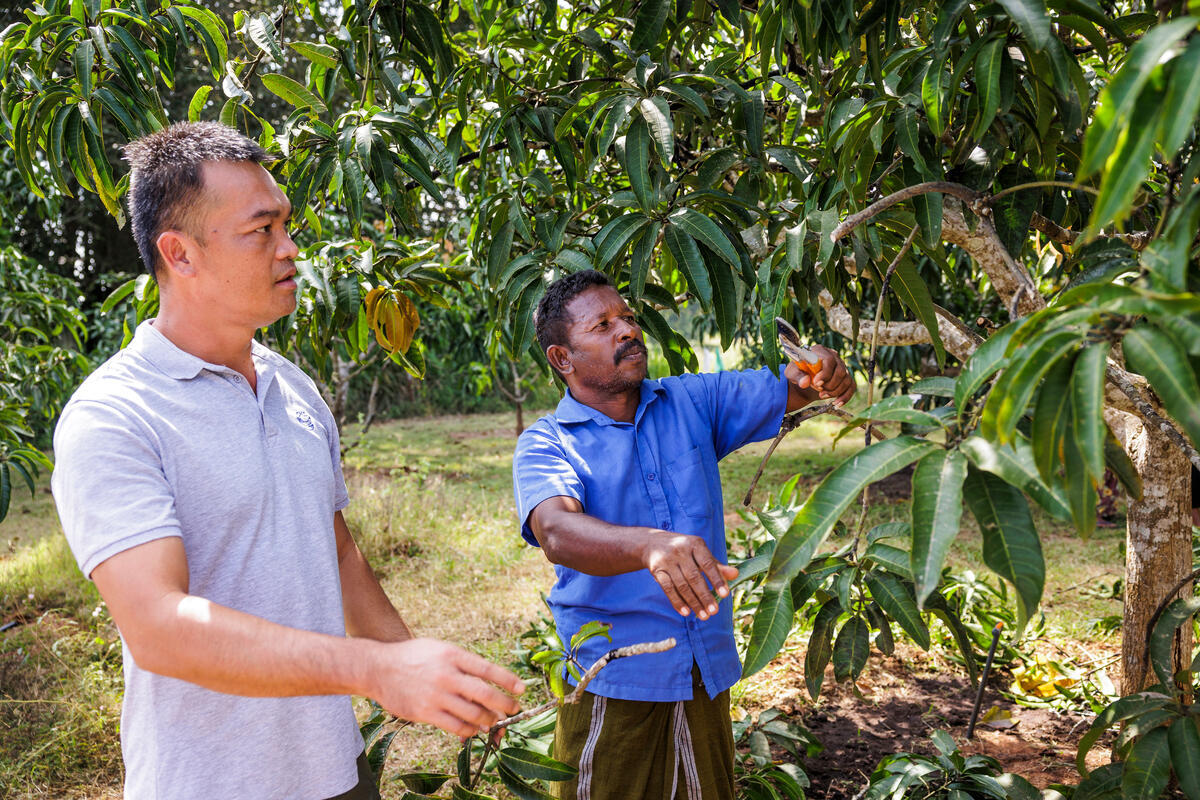 IMAGE 1 Nochchiyagama, Sri Lanka. LSM Dissanayake, a mango farmer, prunes one of his trees, under the supervision of Zengxian Zhao, a Chinese expert advisor on crop cultivation. Dissanayake is receiving Chinese agricultural expertise and technological support to improve his harvests.
IMAGE 1 Nochchiyagama, Sri Lanka. LSM Dissanayake, a mango farmer, prunes one of his trees, under the supervision of Zengxian Zhao, a Chinese expert advisor on crop cultivation. Dissanayake is receiving Chinese agricultural expertise and technological support to improve his harvests.
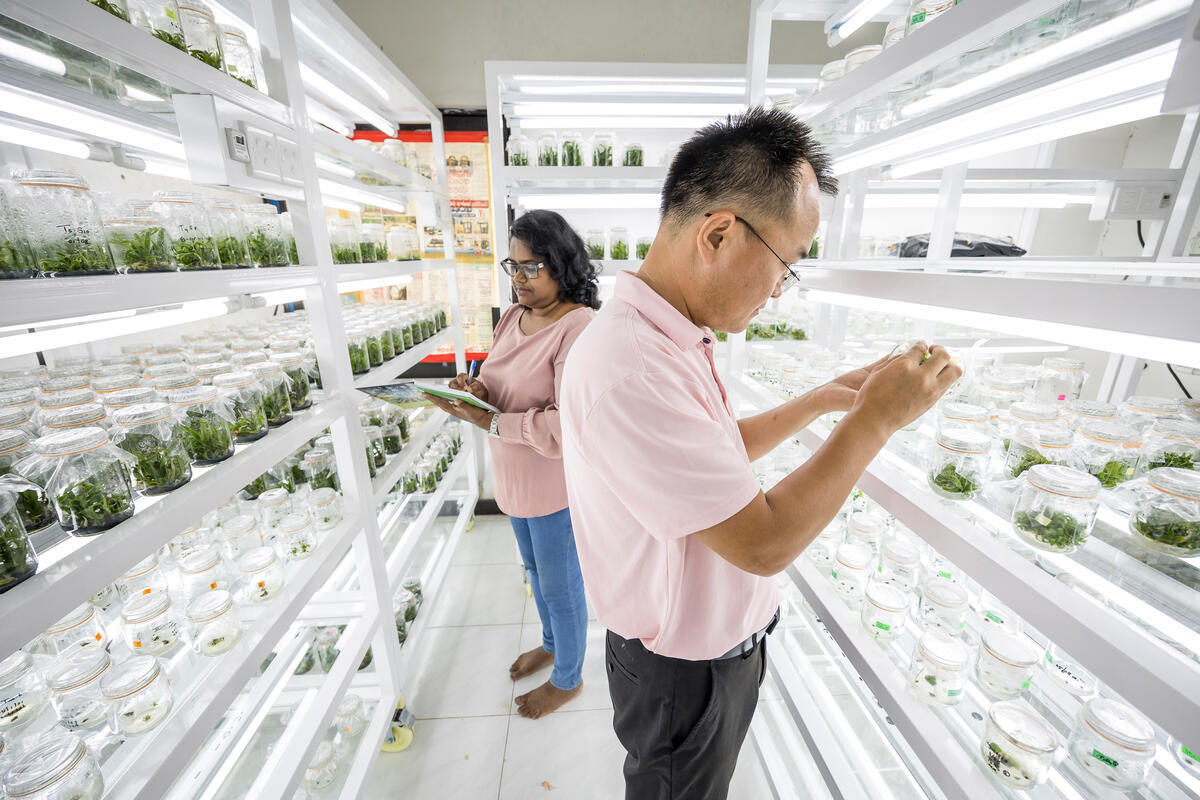 IMAGE 2Horana, Sri Lanka. Dr RNI Perera (L), Deputy Director of Research, FRDI, and Lijun Guo (R), a Chinese tissue culture expert advisor, examine banana and pineapple suckers in the culture room of the Food Research and Development Institute.
IMAGE 2Horana, Sri Lanka. Dr RNI Perera (L), Deputy Director of Research, FRDI, and Lijun Guo (R), a Chinese tissue culture expert advisor, examine banana and pineapple suckers in the culture room of the Food Research and Development Institute.
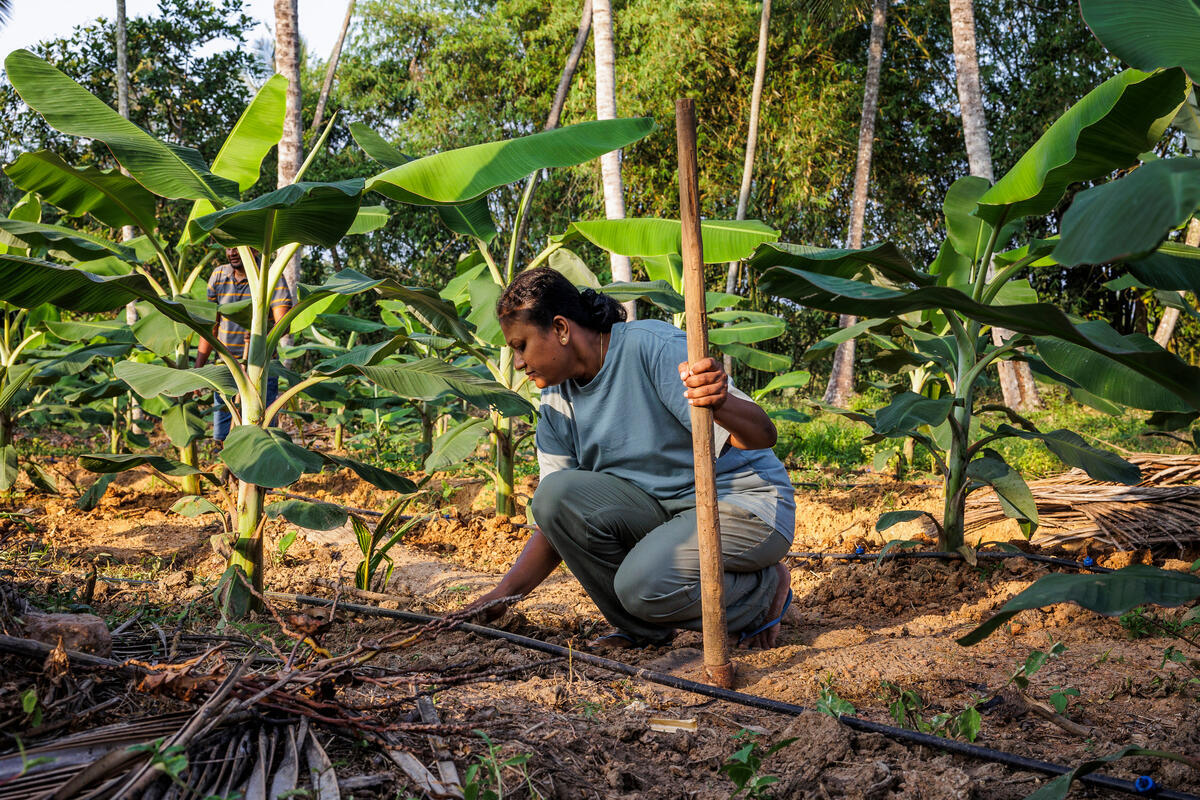 IMAGE 3 Makandura, Sri Lanka. Nimali Wijesooriya works on her banana farm. Nimali is receiving Chinese agricultural expertise and technological support to improve her plantation’s yields.
IMAGE 3 Makandura, Sri Lanka. Nimali Wijesooriya works on her banana farm. Nimali is receiving Chinese agricultural expertise and technological support to improve her plantation’s yields.
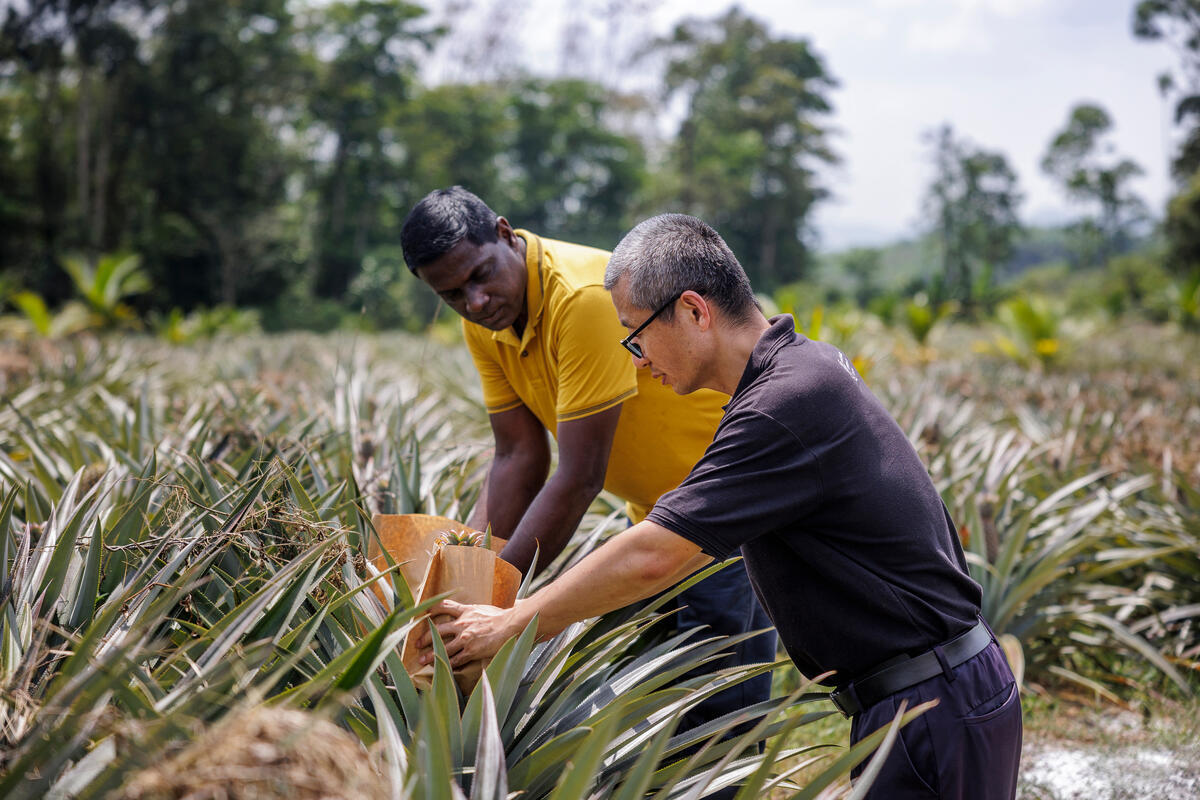 IMAGE 4 Horana, Sri Lanka. BHS Lakmal (L), a pineapple farmer, and Jifeng Li (R), a Chinese agriculture expert advisor, cover pineapples with paper protection against pests and the elements, as the fruit approach harvest time.
IMAGE 4 Horana, Sri Lanka. BHS Lakmal (L), a pineapple farmer, and Jifeng Li (R), a Chinese agriculture expert advisor, cover pineapples with paper protection against pests and the elements, as the fruit approach harvest time.
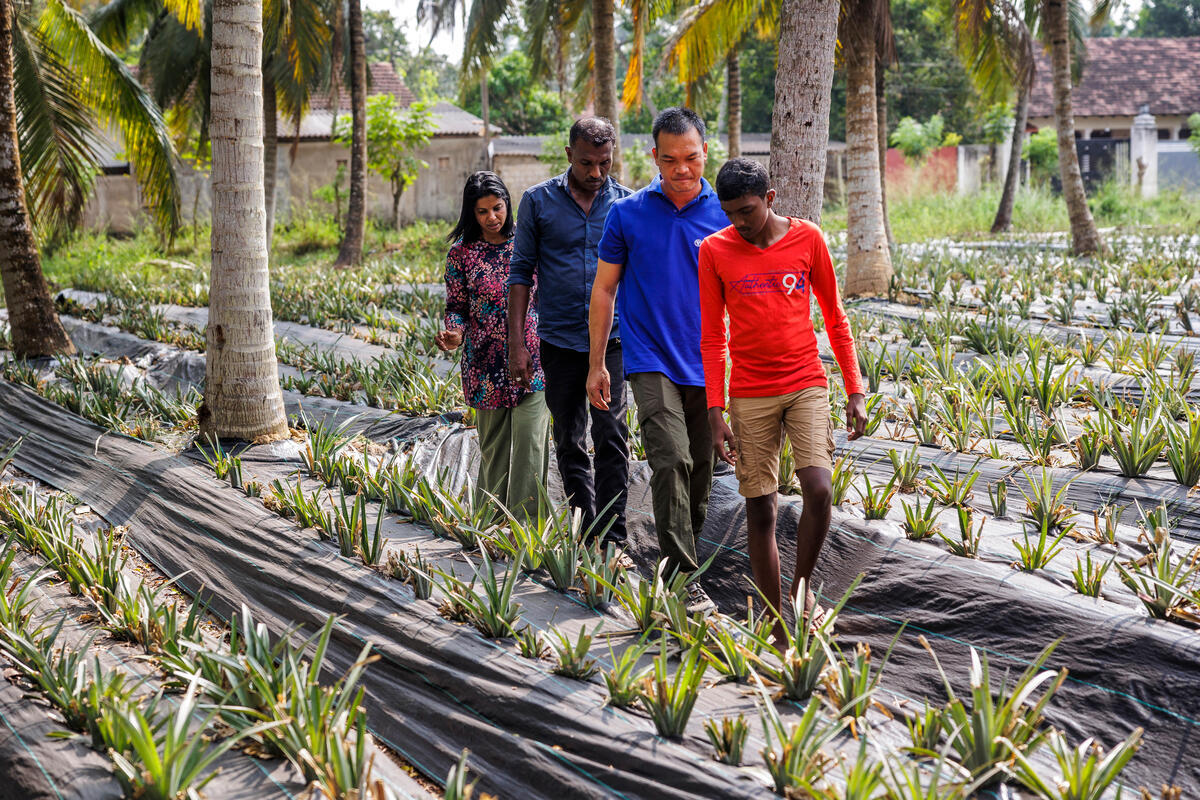 IMAGE 5Makandura, Sri Lanka. (L-R) Dr Darshani Jayamanne, an agronomist, and Additional Director of the pineapple Research Centre, Krishan Poorna, a pineapple farmer, Zengxian Zhao, a Chinese crop cultivation expert, and Poorna’s 13-year-old son, Thuhan, inspect the family fields. Poorna has just begun receiving Chinese agricultural expertise and technological support to improve his farm’s yields.
IMAGE 5Makandura, Sri Lanka. (L-R) Dr Darshani Jayamanne, an agronomist, and Additional Director of the pineapple Research Centre, Krishan Poorna, a pineapple farmer, Zengxian Zhao, a Chinese crop cultivation expert, and Poorna’s 13-year-old son, Thuhan, inspect the family fields. Poorna has just begun receiving Chinese agricultural expertise and technological support to improve his farm’s yields.
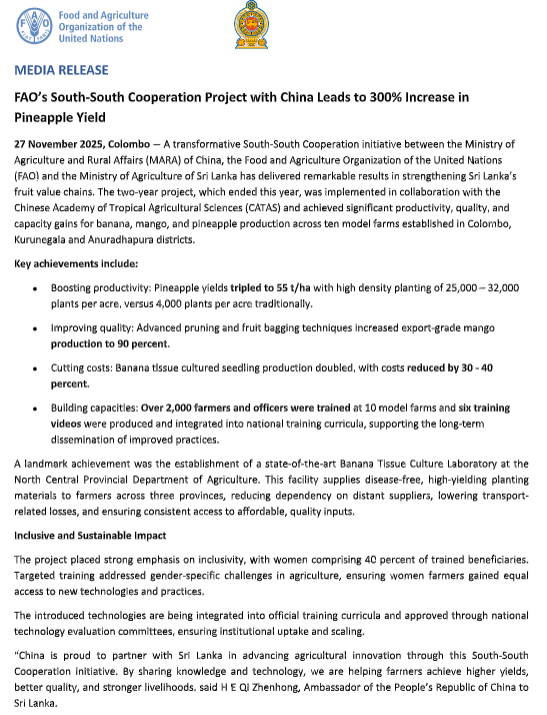
Page 50 of 663